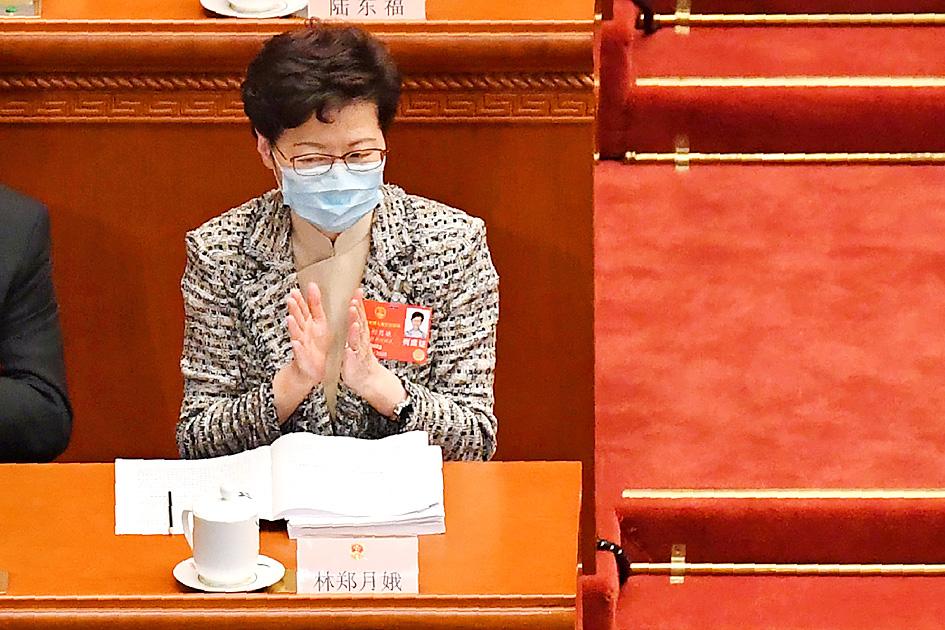The government and the Chinese Nationalist Party (KMT) yesterday both spoke out against plans by the Chinese government to enact a national security law in Hong Kong.
Chinese officials yesterday confirmed that the National People’s Congress would review a bill “on establishing and improving the legal system and enforcement mechanisms for the Hong Kong Special Administrative Region to safeguard national security.”
The Presidential Office said that the announcement was evidence that the “one country, two systems” framework fundamentally clashes with democratic freedoms.

Photo: AFP
The de-escalation of tensions between Hong Kong and Beijing relies on the Chinese government’s willingness to respond to Hong Kongers’ demands, and to establish elections for Hong Kong Legislative Council members and the chief executive, Presidential Office spokesperson Alex Huang (黃重諺) said.
Executive Yuan spokesman Ting Yi-ming (丁怡銘) quoted Premier Su Tseng-chang (蘇貞昌) as saying that the bill would break the Chinese Communist Party’s promise that it would guarantee Hong Kong 50 years of autonomy, seriously compromising Hong Kongers’ democratic freedoms.
Beijing’s announcement would only stoke Hong Kongers’ discontent and increase social instability, the Mainland Affairs Council said, adding that the move might undermine Hong Kong’s status as an international financial center.
Beijing cannot comprehend that the source of dissent and unrest in Hong Kong is not so-called “foreign influence” and the pro-democracy movement, which is why it is emphasizing a legislative solution to such perceived threats, it said.
The government should be the people’s protector, not their jailer, it added, calling on Beijing not to sow further chaos in Hong Kong.
The Democratic Progressive Party said that if the legislation passes, it would change Hong Kong’s fate forever.
“It is more than trampling on Hong Kong’s democratic form of government. It is telling the world that the ‘one country, two systems’ concept is dead,” the party said.
Beijing’s announcement, if carried through, would not win the hearts and minds of Hong Kongers, nor would it win Beijing any sympathy in the international community, it added.
The KMT said that Beijing should be careful, as the proposed legislation would hit a raw nerve with Hong Kongers.
Hong Kong’s autonomy, freedom of speech and freedom of assembly should be respected and upheld, it said, calling on Beijing to allow elections for Legislative Council members and the chief executive.
The Republic of China is an independent, sovereign nation and rejects the “one country, two systems” framework, the KMT added.
“Beijing’s handling of the Hong Kong situation concerns not only the fortune of Hong Kongers, but could also affect the development of the Chinese mainland area, as well as the direction of cross-strait relations,” the KMT said, calling on Beijing to constructively address Hong Kongers’ concerns and meet their expectations.
Additional reporting by Sean Lin

A Ministry of Foreign Affairs official yesterday said that a delegation that visited China for an APEC meeting did not receive any kind of treatment that downgraded Taiwan’s sovereignty. Department of International Organizations Director-General Jonathan Sun (孫儉元) said that he and a group of ministry officials visited Shenzhen, China, to attend the APEC Informal Senior Officials’ Meeting last month. The trip went “smoothly and safely” for all Taiwanese delegates, as the Chinese side arranged the trip in accordance with long-standing practices, Sun said at the ministry’s weekly briefing. The Taiwanese group did not encounter any political suppression, he said. Sun made the remarks when

PREPAREDNESS: Given the difficulty of importing ammunition during wartime, the Ministry of National Defense said it would prioritize ‘coproduction’ partnerships A newly formed unit of the Marine Corps tasked with land-based security operations has recently replaced its aging, domestically produced rifles with more advanced, US-made M4A1 rifles, a source said yesterday. The unnamed source familiar with the matter said the First Security Battalion of the Marine Corps’ Air Defense and Base Guard Group has replaced its older T65K2 rifles, which have been in service since the late 1980s, with the newly received M4A1s. The source did not say exactly when the upgrade took place or how many M4A1s were issued to the battalion. The confirmation came after Chinese-language media reported

The Taiwanese passport ranked 33rd in a global listing of passports by convenience this month, rising three places from last month’s ranking, but matching its position in January last year. The Henley Passport Index, an international ranking of passports by the number of designations its holder can travel to without a visa, showed that the Taiwan passport enables holders to travel to 139 countries and territories without a visa. Singapore’s passport was ranked the most powerful with visa-free access to 192 destinations out of 227, according to the index published on Tuesday by UK-based migration investment consultancy firm Henley and Partners. Japan’s and

BROAD AGREEMENT: The two are nearing a trade deal to reduce Taiwan’s tariff to 15% and a commitment for TSMC to build five more fabs, a ‘New York Times’ report said Taiwan and the US have reached a broad consensus on a trade deal, the Executive Yuan’s Office of Trade Negotiations said yesterday, after a report said that Washington is set to reduce Taiwan’s tariff rate to 15 percent. The New York Times on Monday reported that the two nations are nearing a trade deal to reduce Taiwan’s tariff rate to 15 percent and commit Taiwan Semiconductor Manufacturing Co (TSMC, 台積電) to building at least five more facilities in the US. “The agreement, which has been under negotiation for months, is being legally scrubbed and could be announced this month,” the paper said,